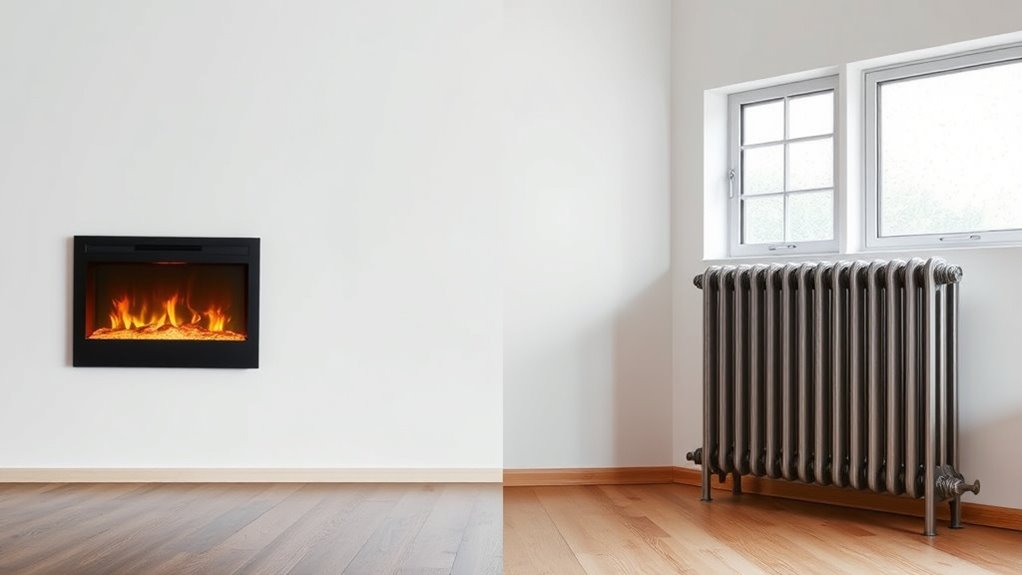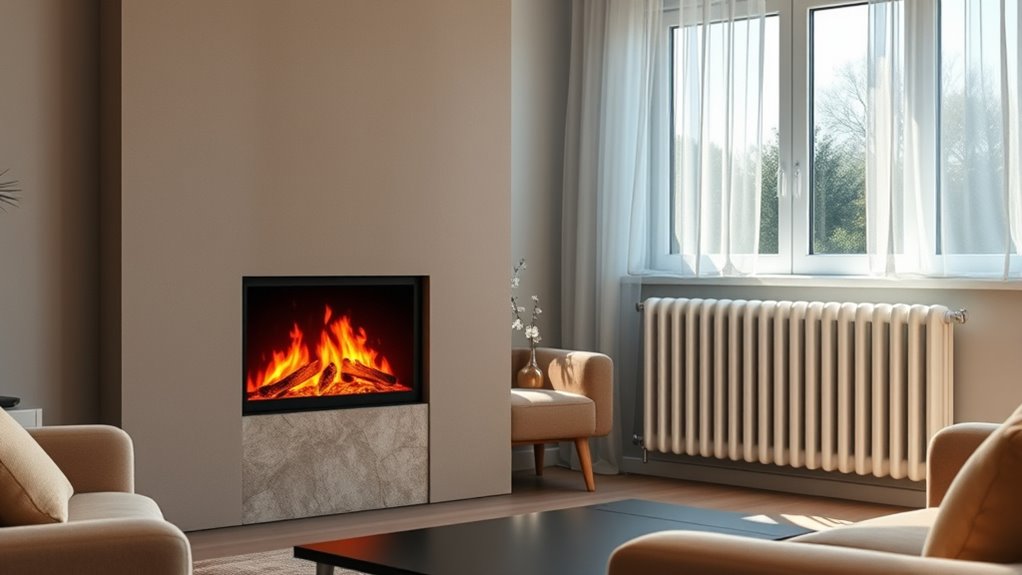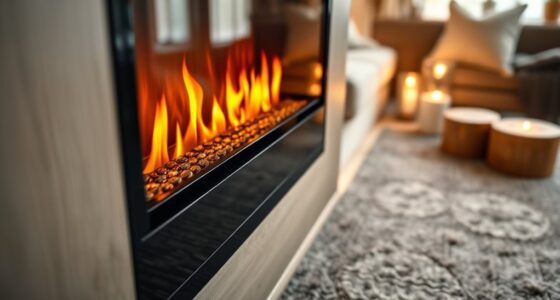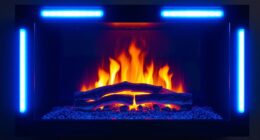When comparing costs, electric fireplaces usually cost less upfront and are quicker to install since they only need a standard outlet. Central heating systems involve higher initial expenses due to ductwork, equipment, and professional setup. While electric fireplaces are more affordable initially, they may be less energy efficient if used as the main heat source. Conversely, central systems can be more cost-effective long-term but require higher investments. To understand which option suits your budget and needs, you’ll find helpful details below.
Key Takeaways
- Electric fireplaces have lower upfront installation costs and can be set up quickly, unlike the higher costs of installing central heating systems.
- Central heating systems typically offer more uniform warmth but involve higher installation and maintenance expenses.
- Electric fireplaces are cost-effective for supplemental heating and ambiance, whereas central systems may reduce long-term energy bills if properly maintained.
- Operational costs depend on electricity prices and efficiency; electric fireplaces are efficient locally but may be costlier to run overall.
- The best choice depends on budget, home size, and heating needs, balancing initial investment versus ongoing expenses.

When choosing a heating solution for your home, understanding the differences between electric fireplaces and central heating is essential. Cost comparison is a major factor in making that decision, and it involves looking at both installation costs and ongoing expenses like energy efficiency. Electric fireplaces typically have lower upfront costs because they don’t require extensive ductwork or modifications to your existing infrastructure. You can install one in a matter of hours, often just plugging it into a standard outlet, which makes it an affordable option for many households. Central heating systems, on the other hand, usually involve higher installation costs. They often require professional installation, including ductwork, boilers, or furnaces, which can add up quickly. If you’re retrofitting an older home, these costs might be even steeper, especially if you need to upgrade your electrical system or add new vents. Additionally, the overall energy efficiency of heating systems can be impacted by factors like home insulation, which plays a crucial role in how effectively any heating method keeps your space warm.
When comparing energy efficiency, electric fireplaces generally perform well on a localized basis. They convert electricity directly into heat, so they’re quite efficient in delivering warmth right where you need it. However, their overall energy efficiency may be lower if your home relies solely on electric heating because electricity production can be less efficient depending on your energy source. Central heating systems can be highly efficient, especially modern models that use condensing boilers or advanced heat pumps. These systems distribute heat evenly throughout your home, which can reduce overall energy consumption. But keep in mind, their efficiency depends heavily on proper insulation and ductwork maintenance. If your home isn’t well-insulated, the energy savings from a central system might not be as significant as you’d expect.
From a cost perspective, electric fireplaces are more economical initially and tend to have lower maintenance costs over time. They don’t require regular servicing like a central furnace does, and repairs are often simpler and cheaper. Conversely, central heating systems, while more expensive to install, can provide consistent warmth for the entire house, potentially leading to savings on energy bills if they operate efficiently. But if you only need supplemental heat or want to add ambiance to a room, an electric fireplace could be the more cost-effective choice. Ultimately, your decision hinges on your specific needs, budget, and how much you prioritize installation costs versus ongoing energy efficiency. Both options have their merits, but understanding these cost factors helps you choose the solution that best fits your home and financial situation.
Frequently Asked Questions
Which Heating Option Is More Environmentally Friendly?
You’ll find electric fireplaces more environmentally friendly because they use renewable energy sources, reducing your carbon footprint. Unlike central heating, which often relies on fossil fuels that release greenhouse gases, electric options can run on renewable power like solar or wind. By choosing an electric fireplace, you’re supporting cleaner energy and helping to lower your environmental impact, making it a smarter, greener choice for heating your home.
Can Electric Fireplaces Replace Central Heating Entirely?
Electric fireplaces can’t fully replace central heating because they’re less energy-efficient for warming entire homes. They’re great for supplemental heating or creating cozy atmospheres, but relying on them alone will likely increase your energy costs and maintenance needs compared to central systems. Central heating is designed to efficiently heat larger spaces, making it the better choice for whole-home comfort and lower ongoing maintenance costs.
How Do Installation Costs Compare for Both Options?
Imagine opening your wallet to find installation costs and maintenance expenses as the key players. Electric fireplaces typically cost less to install—no ductwork or vents needed—making them a quick, budget-friendly upgrade. Central heating, like a well-oiled machine, demands higher installation costs and ongoing maintenance expenses to keep it running smoothly. So, if you’re counting pennies upfront, electric fireplaces win the race with their simpler, cheaper setup.
Are There Health Benefits Associated With Electric Fireplaces?
You might find electric fireplaces offer health benefits like indoor air quality improvement and allergy relief. Unlike central heating, they don’t blow dust or allergens into the air, reducing respiratory irritations. Plus, electric fireplaces don’t produce fumes or combustion byproducts, making them safer for sensitive individuals. This cleaner indoor air environment can help alleviate allergy symptoms and promote better respiratory health, especially for allergy sufferers or those with asthma.
Do Electric Fireplaces Increase Overall Home Value?
Your home’s value skyrockets when you add an electric fireplace, transforming your space into a stunning showstopper. It’s like turning your home decor into an instant masterpiece! Plus, you’ll enjoy energy savings that make your wallet smile. Future buyers see the cozy ambiance and modern appeal, making your home irresistible. So yes, electric fireplaces boost your home’s overall value, making every dollar spent a smart investment.
Conclusion
Ultimately, choosing between an electric fireplace and central heating depends on your needs and budget. For example, Sarah installed an electric fireplace in her living room and saved on her monthly bills compared to her old central heating system. If you want cozy ambiance and lower upfront costs, an electric fireplace might be your best bet. However, for whole-home warmth, central heating still offers better efficiency. Consider your space and priorities to make the right choice.









